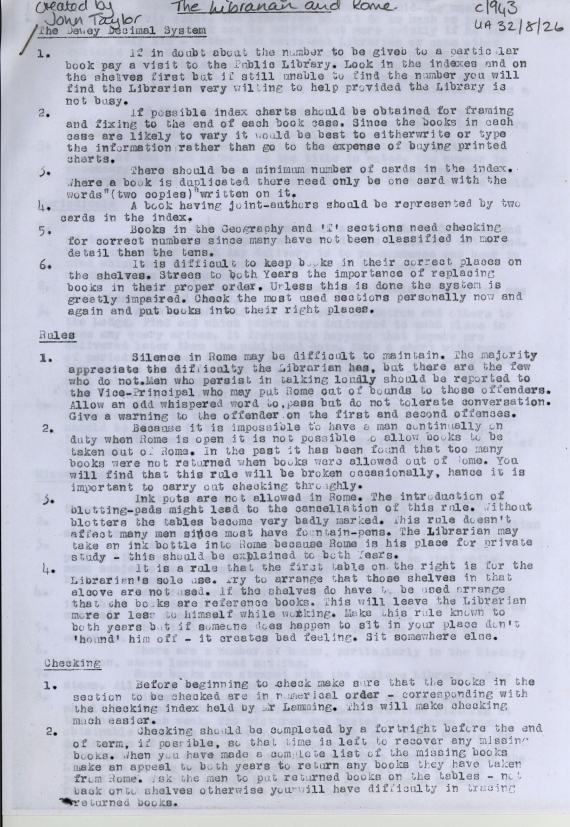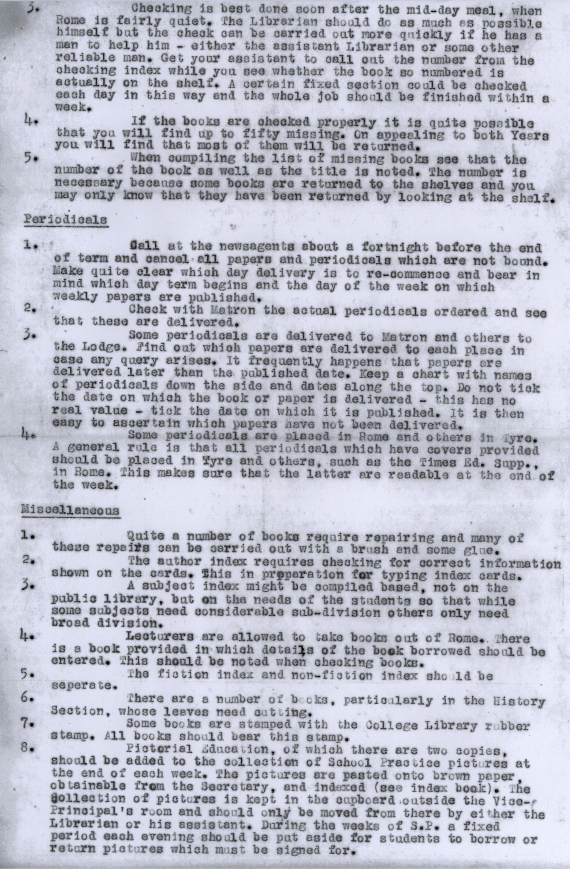I have a confession to make. The CILIP “Social Media Policy” that was the namesake of my post “On Moaners” I published on 27th of February is not an actual social media policy CILIP adopted. It was a proposed social media policy put to the CILIP board. Who knows what happened to it after that? What I do know is that it was published online and it is the only (and first) thing resembling a social media policy to appear in the searches I conducted. I asked CILIP repeatedly before writing my post what their social media policy was and, if you read that post you will know the CILIPinfo Twitter account never engages with me (there is irony in that account name, right?!), so I used what I had.
My “moaners” post generated a lot of chat on Twitter, mainly from people telling me their experience with CILIP mirrored my own and that getting any advice, support or guidance from the professional body is often met with tumbleweed. The post was also read at the time by senior people of CILIP, some of whom told me I had made no tangible points throughout. Not a one of them mentioned the paper wasn’t CILIP Social Media Policy. It wasn’t until 6th April CILIP tweeted this in response to another person complaining about the “policy”.
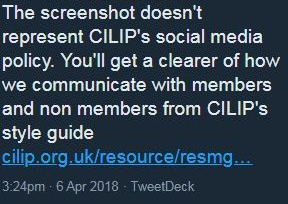
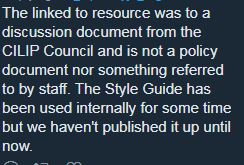
to which CILIP got the understandably baffled response….
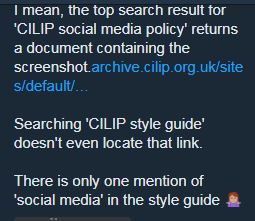
and then the “Social Media Policy” was taken offline.
The Chartered Institute of Library and Information Professionals does NOT have a social media policy and instead refers to a “style guide“? This cannot be right can it?
Here is the CEO of CILIP a few days later
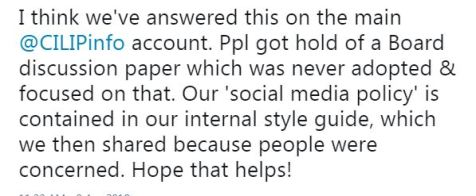
This is problematic and really concerning given the profession we are speaking of.
Lots of my fellow information professionals raised some noteworthy concerns about the position CILIP has taken and I think they are too important to get lost on Twitter so I will summarize our conversations and share them with you here just in case CILIP ever do decide to engage with, and take advice, from the very knowledgeable information community
- It is concerning that CILIP board was ever presented with a paper that referred to people as moaners and then posted it online. It gives a worrying impression of the attitude within the organisation. I would like to think it does not represent the attitude of many CILIP staff but it is certainly an attitude many of us have felt on the receiving end of. I don’t think any of us expected to see it so clearly written in black and white though.
- Sure, the paper had weaknesses but why did CILIP decide it didn’t need a social media policy and that a style guide was an appropriate alternative? At the very least it demonstrates a lack of duty of care for their staff. I tell all my students to ask new employers about their social media policy so they know where they stand if they encounter any problems. We all know of examples where people have fallen foul of social media, right?! We all do! “Think before you post” is a mantra we tell people all the time. People have lost their jobs for not doing so. Not only this but social media policy protects the organisation should anything go wrong.
Social media policies also manage the expectations of people engaging with a social media account (it is exactly why I asked for sight of the social media policy myself! I thought it may explain why I was being ignored).
I, and I know many others do too, judge an organisation on its social media presence. If you are there…use it well otherwise you risk looking very unprofessional. - There are two reasons for a professional body to write social media policy. The first, as I discuss above, is to set out guidance and expectations for your own staff within the organisation. The second is to provide a template and guidance for the wider professional community. The British Association for Social Workers policy is one of many examples out there. Many information services are part of a bigger organisation that have their own social media policies their staff are guided by. The University I work for has an overarching one, the library service doesn’t have a separate one. Some information services are not in this position and so need to develop their own. Not everyone working in these services can be experts in writing such policy, so where do they go for guidance?…CILIP. Since uncovering this issue I have had contact from one Librarian who has said the CILIP Social Media Policy proposal paper features on NHS service documentation as guidance for this very reason. Below are bits of the conversation I had with the librarian.


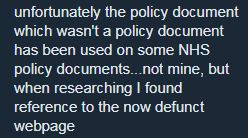
It is not just me who assumed this policy paper was the stance of CILIP in the absence of anything else. People are actually using the paper in practice! I don’t need to tell you about how this raises all kinds of questions about the information governance and management.
- A style guide is NOT the same thing as a social media policy. For this point, I am going to leave you some thoughts of fellow professionals responding to the matter on Twitter…
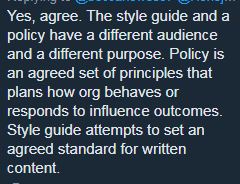
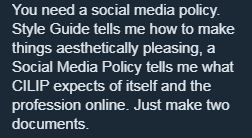
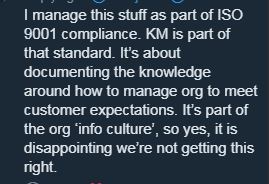
So, the style guide? well….as several people pointed out to CILIP….
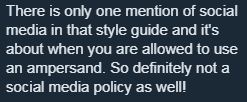
Because it is only the dreaded ampersand you need to worry about when using social media, right?
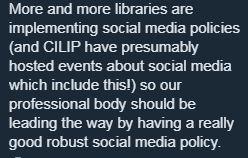
The CILIP account told one tweeter that as they are a very small team and “social media is one of the many hats” they have to wear they cannot respond to every enquiry. I would argue this is the case for the majority of us and it is no excuse. Except for big organisations with a lot of money, who can afford a separate social media team? If you only have the capacity to broadcast and not deal with enquiries then say so in your social media profile and policy. Signpost people to where they can have their enquiries answered. A totally random approach to engagement looks, and is, really unprofessional.
This may seem like a minor issue but it isn’t. Social media is where people are. It is where ideas are discussed, experiences shared, networks built. In a contentious piece of research (please apply your critical brains) CILIP recently claimed that Librarians are in the top five of the “most trusted professions”. If the professional body can’t get the basics right then that trust is unfounded. The CEO recently tweeted
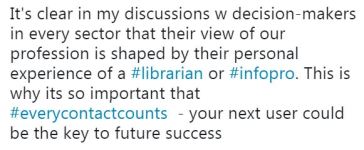
There are many things I found problematic about this statement. The view of our profession is shaped more by politics and money than it is by what we say in our every day lives (if only we had that power!) but I would recommend that he applies his own advice to the management of CILIP because every contact, or lack of it, is shaping how professionals view CILIP and therefore its future success. Meanwhile, I am left feeling much like this person…
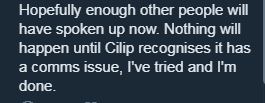

p.s. CILIP and Nick Poole were included in all of the twitter conversation posted but have yet to respond.
